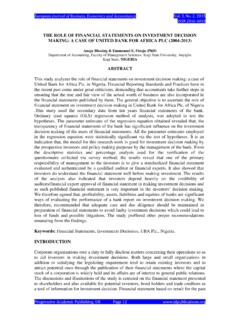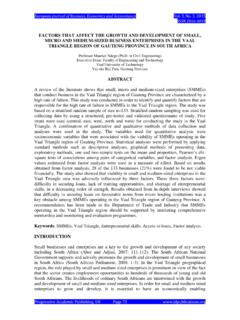Transcription of THE DIFFERENCE OF ACTION RESEARCH WITH TRADITIONAL ...
1 European Journal of RESEARCH and Reflection in Educational Sciences Vol. 7 No. 12, 2019 ISSN 2056-5852 Progressive Academic Publishing, UK Page 145 THE DIFFERENCE OF ACTION RESEARCH WITH TRADITIONAL RESEARCH AND THE ROLE OF ACTION RESEARCH IN teaching FL Abdullayeva , Arifjanova , Mingniyozova , Turayeva Abdullayeva Munojot Muxtorovna-teacher Arifjanova Nilufar Mirsidikovna- teacher Mengniyozova Zebo Axmadovna- teacher Turayeva Diyora Ixtiyarovna- teacher DEPARTMENT OF COMPARATIVE LINGUISTICS, NATIONAL UNIVERSITY OF UZBEKISTAN, TASHKENT REBUBLIC OF UZBEKISTAN ABSTRACT The article discusses the benefits of using ACTION RESEARCH as one of inductive type of RESEARCH , moreover as advantages of this method in addressing the disadvantages and difficulties in teaching foreign languages.
2 Keywords: ACTION RESEARCH , TRADITIONAL RESEARCH , cycle of ACTION RESEARCH , teacher ACTION RESEARCH foreign language. INTRODUCTION, LITERATURE REVIEW AND DISCUSSION This article addresses as a project a unit in ACTION RESEARCH methodology provides those professionals working in the education system with a systematic, reflective approach to address areas of need within their various sphere. Moreover, article discusses the DIFFERENCE of ACTION RESEARCH with TRADITIONAL RESEARCH within the role of ACTION RESEARCH in training FL. More specifically, the professional practice employed by one or group of researches to teach the ACTION RESEARCH units. ACTION RESEARCH in Education for last years consecutively, and believes the skills and knowledge developed as part of task this unit are very important within teacher education and the teaching profession.
3 A teacher who respects his or her profession and wants to solve problems in the language learning process should always ask the following questions: How can I get the students to enjoy learning? How can I make my classroom more interesting for students ? How might we conduct teacher evaluation processes in this school in ways that will improve teaching and learning? How can I encourage more parental support for what does on the classroom? How can I adapt an already demanding curriculum to better meet the specific needs of the students in my class? How might we work together better as a staff to establish such things as school objectives, philosophy and budget priorities? . To find answer to these questions we must find a way of bridging the TRADITIONAL divide between educational theory and professional practice.
4 Educators can conduct, practice-oriented RESEARCH to improve their classroom practice by collecting data about their daily activities, problems, and outcomes for the purpose of improving themselves as teachers and their students as learners. Teacher-initiated, School-based RESEARCH used to improve the practitioner s practice by doing or changing something where the teacher is the researcher and the teacher s practice is the focus of the RESEARCH . The main reason for teachers to engage in ACTION RESEARCH is to learn from and to improve their own teaching activities. So, what is the ACTION RESEARCH at all? Why do we need for it, especially in education? But the teacher can only find answers to these questions through his or her RESEARCH on existing problems.
5 In this case the researcher can choose the European Journal of RESEARCH and Reflection in Educational Sciences Vol. 7 No. 12, 2019 ISSN 2056-5852 Progressive Academic Publishing, UK Page 146 appropriate method of RESEARCH . These may be TRADITIONAL or ACTION RESEARCH . There are mentioned some differences between TRADITIONAL and ACTION RESEARCH . ACTION RESEARCH It is similar to TRADITIONAL RESEARCH in regards to collecting and analyzing data, developing RESEARCH question, reporting a conclusion. It is a process that integrates practical pursuit, theory and practice, and community-school-based participants to identify practical solutions about a concern. Below are the following purpose and features of ACTION RESEARCH : Developed in 1940 s by a psychologist Kurt Lewin.
6 It is a RESEARCH process investigating about a problem. Aim is to improve teaching and learning. Extensive and repetitive process. Collaboration of school community including educators, parents, community activists, and university-based colleagues. Conducted to lobby changes or change policies. Directly benefits school practitioners involved in the RESEARCH such as educators and the school district itself. TRADITIONAL RESEARCH Face-to-face interaction between researcher and the participant. Still more effective than most online RESEARCH . Used a lot for qualitative RESEARCH to capture participant s emotional reaction. Theory development and testing is conducted separately. Knowledge in teaching and learning is developed outside schools or not developed by educators.
7 Table 1. Differences between TRADITIONAL and ACTION RESEARCH Looking at the table above we can say that TRADITIONAL RESEARCH then attempts theorization in relation to a small number of alternations and is for the sole purpose of providing problem-solving solutions. ACTION RESEARCH , on the other hand, seeks decentralize strategies for specific European Journal of RESEARCH and Reflection in Educational Sciences Vol. 7 No. 12, 2019 ISSN 2056-5852 Progressive Academic Publishing, UK Page 147 issues, providing answers that impact and enhance all the people involved in the RESEARCH . ACTION RESEARCH seeks to close the distance between scientist and practitioner; making RESEARCH methods and results possible and relevant in the school and in the classroom.
8 ACTION RESEARCH is RESEARCH used by teachers, supervisors and administrators to improve the quality of their decisions and actions. ACTION RESEARCH is focused on the immediate application, not on the development of theory. It has placed its emphasis on real problem here and now in a local setting. ( Yogesh Kumar,2016:48) The field of education often uses ACTION RESEARCH , an interactive method of collecting information that's used to explore topics of teaching , curriculum development and student behavior in the classroom. ( ACTION RESEARCH in education: Methods and Examples. Jessica Mc Collister). All in all ACTION RESEARCH is a prosses where using the techniques and methods of RESEARCH such as Observing individuals or groups Using audio and video tape recording Using structured or semi-structured interviews Taking field notes Using analytic memoing Using or taking photography Distributing surveys or questionnaires.
9 ( ACTION RESEARCH in education: Methods and Exaples. Jessica Mc Collister) . During the process participants can analyze and examine their educational practice carefully and systematically. In all professional fields, the goal of ACTION RESEARCH is to improve processes. But to achieve the best result the researcher should follow to the cyclical or spiral process of ACTION RESEARCH . Figure1. Cycle of ACTION RESEARCH RESEARCH is a cyclical process of steps that typically begins with identifying the problem or issue of the study. It then consists of reviewing the literature, specifying a purpose for the study, and forming an interpretation of the information. This process culminates in a report disseminated to the audience that is evaluated and used in the educational community (Creswell 2002).
10 It is a cycle because of the researcher and the group is working with are researching some type of problem and issue and then in the next step they work to fix or change it. See the illustration below. If you think it looks amazingly like the process of Continuous Improvement, you re right. It s basically the process of continuous advancement as a aspect of participatory European Journal of RESEARCH and Reflection in Educational Sciences Vol. 7 No. 12, 2019 ISSN 2056-5852 Progressive Academic Publishing, UK Page 148 RESEARCH . Reflective teachers analyze the students behaviors, identify potential problems, modify their teaching practices , and evaluate the results. Some ideas succeed; others fail sometimes surprisingly.









